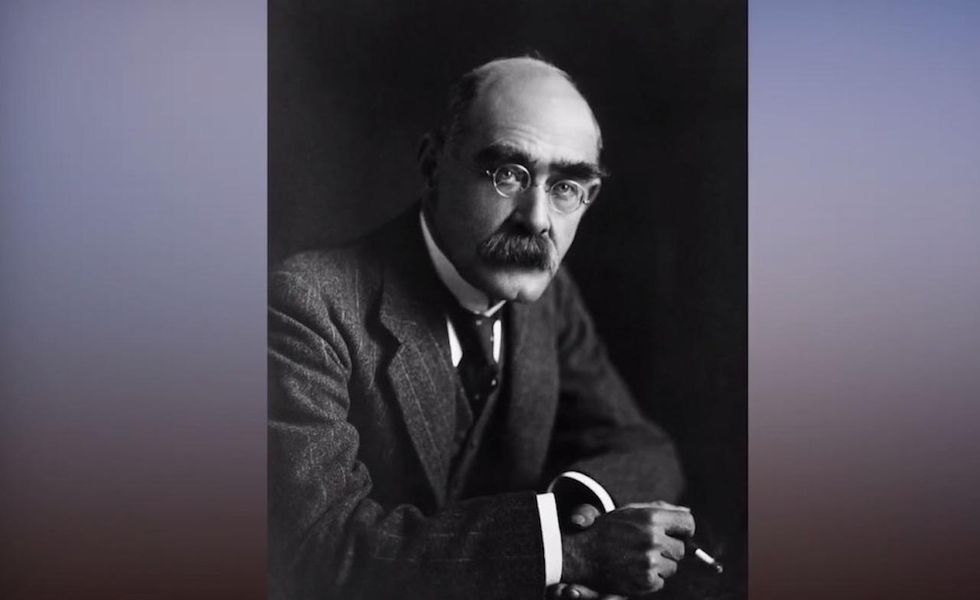
Students from Manchester University in Great Britain scrubbed Rudyard Kipling's famous poem "If" from a wall in the students' union because they deemed its author a racist and "imperialist." (Image source: YouTube screenshot)

Students from Manchester University in Great Britain scrubbed Rudyard Kipling's famous poem "If" — "If you can keep your head when all about you / Are losing theirs and blaming it on you" — from a wall in the students' union because they deemed its author a racist and "imperialist," the Telegraph reported.
Sara Khan, the SU's liberation and access officer, noted that "If" was replaced with "Still I Rise" by black poet Maya Angelou:
Khan noted on Facebook that "we, as an exec team, believe that Kipling stands for the opposite of liberation, empowerment, and human rights — the things that we, as an SU, stand for."
She added that given Kipling also is the author of "White Man's Burden" — which Khan called a "racist poem" — along with "a plethora of other work that sought to legitimate the British Empire’s presence in India and de-humanize people of color, it is deeply inappropriate to promote the work of Kipling in our SU, which is named after prominent South African anti-Apartheid activist, Steve Biko."
Khan added that replacing "If" with "Still I Rise" was "a statement on the reclamation of history by those who have been oppressed by the likes of Kipling for so many centuries, and continue to be to this day."
Fatima Abid, the SU's general secretary, said student leaders decided within an hour after seeing the Kipling poem earlier this month that it had to be removed, the paper reported.
“God knows black and brown voices have been written out of history enough, and it’s time we try to reverse that, at the very least in our union,” Abid noted in a tweet, in which she called Kipling an "imperialist." Abid's tweet has since been deleted.
Manchester University declined to comment, the Telegraph reported, noting it was a matter for the students’ union.
"We understand that we made a mistake in our approach to a recent piece of artwork by failing to garner student opinion at the start of a new project," a spokesman for Manchester's SU said, the paper reported. "We accept that the result was inappropriate and for that we apologize."
Check out the following radio debate on the students' actions:
Kipling was the youngest ever winner of the Nobel Prize for Literature, the Telegraph said, adding that his books — which include "Just So Stories" and "The Jungle Book" — are viewed as children's literature classics.
More from the paper:
But his popularity was dented during the twentieth century, when he was seen as an apologist for colonialism, with George Orwell accusing Kipling of being "morally insensitive" and a "prophet of British imperialism."Kipling, who was born in Bombay, has been attacked for writing from a British colonialist perspective, with some of his most famous works have been accused of having racist overtones.
His poem The White Man's Burden has been criticized for suggesting that it was incumbent on the Americans to go and civilize the savages in the Philippines.
But Kipling biographer Andrew Lycett said things have been turning around in others' eyes.
"There’s a younger generation of researchers, PhD students, who are going back to Kipling," Lycett said at a history festival last summer, the Telegraph reported. "He is taught at universities more, there is much more of a sort of willingness to look at him afresh, and to look again at his works and to see what was good about him. People now have a wider perspective on the world and they see that Kipling was a sort of global writer really; he wrote about the world."
Want to witness something scandalous? Check out tennis greats Roger Federer and Rafael Nadal reading "If":
Given the actions of the Manchester University students — the kind of thing that can catch such fire these days — one wonders how long it will take before the Federer-Nadal reading disappears (or when one or both of them disavow the clip).
In the same vein, a line from Kipling's poem is ensconced above the players’ entrance to Centre Court at Wimbledon in London — a four-hour ride south of Manchester:
Could it be long until those words are removed from their spot, too, assuming the good folks at the All England Lawn Tennis and Croquet Club lend an ear to the likes of Manchester University students?